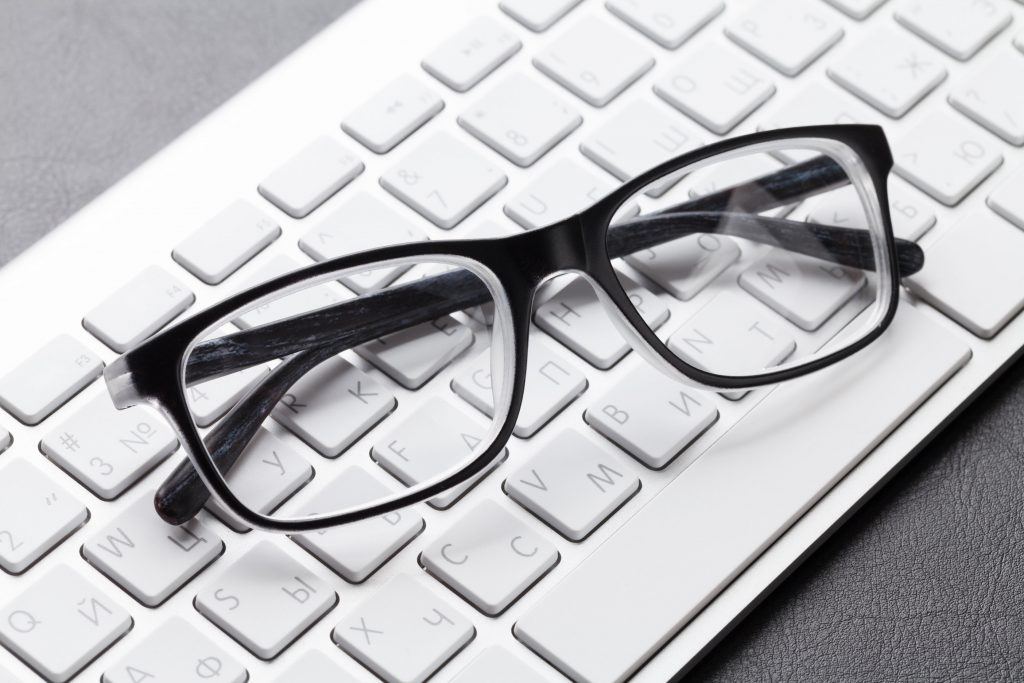
Who else starts their day by checking the phone? Then how many hours do we work in front of a computer? Once home, we relax while watching TV or some TV series on the tablet. And later, exactly before falling asleep, we take a last look at our mobile phones.
The constant repetition of this ‘long screen dose’ could explain some annoying symptoms, like eyestrain, blurry vision, headaches, dry or irritated eyes, neck and back pain, and even insomnia. Can computer glasses fix that?
How does blue light influence our bodies?
How many times have you heard that the blue light of the screens affects us badly? Many, right? However, let’s understand something, blue light is actually good for our health.
Sunlight, just like screens, has a mix of colors in it. Red, orange, yellow, green, blue, indigo and violet light. Each one has different energy and wavelength. Screens work with red, green and blue (RGB pixels).
Light on the red side of the spectrum has less energy and a longer wavelength. While blue light has more energy and a shorter wavelength.
Our bodies are very sensitive to the blue one. So the biggest dose of it, the one we receive daily from the sunlight, improves alertness, memory, mood and it controls our circadian rhythm.
As the sun goes down, our body starts feeling the lack of light and it starts producing melatonin, that hormone that helps us fall asleep.
At night the exposure to blue light sources like fluorescent or LED lights, tablets, smartphones or tv screens delays the production of the hormone. It keeps us alert instead of relaxed. The brain thinks it is still daytime.
How does the blue light work in our eyes?
As for our eyes, there are lots of medical opinions. Some even point risks like nearsightedness and macular degeneration (damage in the retina that causes loss of the visual acuity).
But the debate about how much blue light is required to damage them irretrievably is still open. Blue light can be practically everywhere.
What we know is that the high energy and short wavelength of this light make it disperse more easily so it is harder to focus it. It becomes “visual noise” that reduces contrast. Therefore, different symptoms of the so-called Computer Vision Syndrome can appear (eyestrain, blurry or double vision, etc.).
So should we wear computer glasses or not?
Yes, computer glasses protect our eyes. Choose the right ones based on your specific routine and needs.
These glasses optimize eyesight when we are staring at the screen. While reducing brightness and increasing contrast, the lenses maximize what we see. So our eyes suffer less from fatigue and we can work longer in front of the screen.
The technology to achieve this includes basically, anti-reflective coatings, color tints, and blue-light filters. The quality of computer glasses varies from brand to brand and depends on the materials used too.
The anti-reflective coatings reduce the brightness coming from the screen and other sources of light we have around.
Tints, like the yellow one you have surely seen, improve the contrast and reduce the intensity of the light. That way the muscles of our eyes get more relaxed.
Blue-light blocking filters work by absorbing or blocking the blue light that goes straight into our eyes.
A healthy present and future for our eyes
The digital age we live in makes it unrealistic to completely avoid ‘screen time’. So, let’s protect our eyes as much as possible.
Computer glasses are a choice but also consider the following:
Keep the brightness at acceptable levels. Don’t set it on a maximum level for long.
Keep your eyes at least 40 centimeters away from the screen. The bigger the screen is, the further your eyes should be from it.
Give yourself breaks every 20 or 30 minutes. Relax your eyes by watching distant things or people. Close them for a few seconds.
Blink often. When we are focused, we blink less. So blink to lubricate the eyeballs properly.
Use the ‘night mode’ on your devices. It turns off the blue pixels and provides a warmer image.
Distinguish among symptoms caused by the long exposure to screens and other factors with your doctor’s help. You might have vision problems that could worsen if not checked on time.